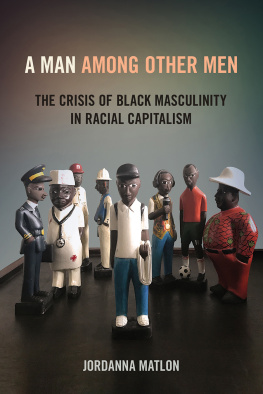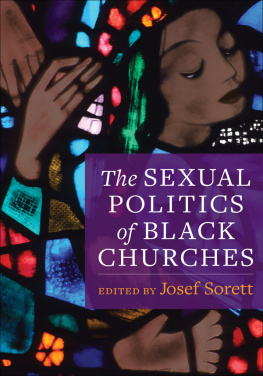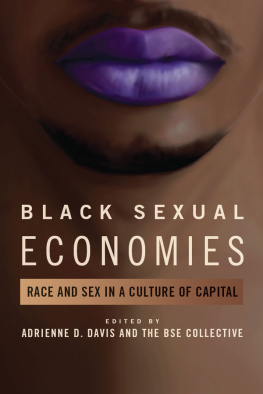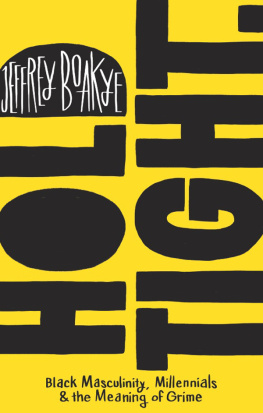Jeffrey Q. McCune, Jr., is an associate professor of Women, Gender, and Sexuality Studies and an associate professor of Performing Studies in the Department of Performing Arts at Washington University.
The University of Chicago Press, Chicago 60637
The University of Chicago Press, Ltd., London
2014 by The University of Chicago
All rights reserved. Published 2014.
Printed in the United States of America
23 22 21 20 19 18 17 16 15 14 1 2 3 4 5
ISBN-13: 978-0-226-09636-0 (cloth)
ISBN-13: 978-0-226-09653-7 (paper)
ISBN-13: 978-0-226-09667-4 (e-book)
DOI: 10.7208/chicago/9780226096674.001.0001
Library of Congress Cataloging-in-Publication Data
McCune, Jeffrey Q., Jr., author.
Sexual discretion: black masculinity and the politics of passing / Jeffrey Q. McCune, Jr.
pages; cm
Includes bibliographical references and index.
ISBN 978-0-226-09636-0 (cloth : alk. paper) ISBN 978-0-226-09653-7 (pbk. : alk. paper) ISBN 978-0-226-09667-4 (e-book)
1. African American gay men. 2. Closeted gays. 3. Gay menRelations with heterosexual women. 4. Masculinity. I. Title.
HQ76.27.A37M33 2014
306.76'6208996073dc23
2013021535

This paper meets the requirements of ANSI/NISO Z39.48-1992 (Permanence of Paper).
PREFACE
In 2005 I wrote, directed, produced, and accidentally starred in Dancin the Down Low, a play based on narratives from interviews collected doing ethnographic research with men who have sex with men and who sometimes have wives/girlfriends. Act II of this play opens with the character Antwon upstage center with his back turned to the audience, while an anonymous man kneels before him performing fellatio. Antwon turns his head, looking over his shoulder, and directly addresses the audience, saying, What yall starin at? Yall never seen a man get his dick sucked? As if this were call and response in the black church, my grandmother, who had sneaked into the theater without my knowledge, screamed in her most emphatic damsel-in-distress tone, Nooooooooo!!!! The whole audience laughed, and I sat backstage thinking, Uh-oh, what have I done?! Or more pointedly, What will I do or say when my mom and I take my grandmother back to her South Side Chicago residence? How would I explain this moment of sexual taboo in the midst of what I am sure my grandmother understood would be a strictly academic performance? In essence, my own sexual identity and politics would be subject to exposure and scrutiny by the McCune family at large, as well as being an embarrassment to them. This was what I had spent my life trying to avoid.
Sexual Discretion: Black Masculinity and the Politics of Passing is about the lives and representations of men who have sex with other men and who view their sexual practices and proclivities as private. In essence, this is a project about black masculinity and its demands on black men, in multiple spacesphysical and discursive. I attempt to explain how the stigma around sexual practices, the mandates of a stable identity formation, and the abjection of non-normative masculinity produce a feeling that prompts many black men to live in secret. I critically explore where much of this maintenance of masculinity happensin the practice of a historical African American politics of sexual discretion. Admittedly, my own recognition of and reverence for such politics nearly kept me from writing this book.
My impulse not to write about taboo stuff was, like most things, informed by multiple sources. It stemmed from years of sitting in pews while ministers recited passages of the Bible as a tool to quiet sexuality. It emerged from the cultural memo that made all discussions of sex between men an indicator of my suspect sexuality and masculinity. This impulse, to keep sex and sexuality in place, was reinforced at my aunt and uncles dinner table, which forbade conversations about fleshly topics that would complicate the flow of conversation. It was also informed by the constant odd hush-hush attitude about the cousin, sister, father, or brother who was that way. Finally, I dare to say, this feeling was fueled by my many black gay friends who chose partners who would try their best to conceal their sexual perversions to save face within the community and society at large. This commitment to keeping sex and sexual discourse down lowdiscreet or privatebecame a second-nature function, in lieu of a cultural mandate for self-surveillance.
This feeling also emerged from the absence of conversations about sexuality within the institutions that shaped me into the man I am todayschools, churches, workplaces, and community buildings where sex and sexuality were supposed to be checked at the door and were subject to high surveillance. In addition, the everyday walk down Chicago city streets reminded me that fags and fruits and punk asses were to be quieteven if the only signifier of my sexuality was the malperformance of masculinity in fashion. Together, these institutions and everyday occurrences have called forth a discrete performance of self that attempts to quiet sexuality and avoid sexual taboos. An everyday feeling transforms into an everyday politicsa way of being in the world that privileges privacy and discretion.
On August 3, 2003, this discreet position would ironically be called out of the closet, as a sexually foreign object called the down low (DL)black men who supposedly had sex with other men while also engaging in sexual relationships with their wives/ girlfriends. Double Lives on the Down Low, a peculiar faux-ethnographic expos of black men, appeared in the New York Times Magazine, beginning with this epigraph:
To their wives and colleagues, theyre straight.
To the men they are having sex with, theyre forging an exuberant new identity.
To the gay world, theyre kidding themselves.
To health officials, theyre spreading AIDS in the black community.
(Denizet-Lewis 2003, 28)
While I was aware of the media buzz around DL men, the presence of this story in the New York Times Magazine signaled a new level of visibility for the topic. This article, loaded with its sensational statistics and hyperbolic stories, was clearly shaped to make certain appeals. Benoit Denizet-Lewiss tongue-in-cheek concern for black womens health and welfare, all the while focusing instead on the tricks and trash of black mens duplicity, was most troubling. Having been in conversation with HIV/AIDS epidemic researchers and practitioners like David Malebranche and Ron Simmons and reading the work of Cathy Cohen and Cindy Patton, I knew that this discourse had all the ingredients of not only creating moral/ cultural panic, but irresponsibly marking black DL men as sexual suspects who are the new vectors of contagion. Furthermore, the manipulation of black female representation had all the telltale signs of another moment of painting these women as victims without sexual agencyall in the service of furthering once again a construction of black men as criminals of sexual deception. Like the son of a preacher woman, my prophetic vision took hold of my academic trajectoryconjuring a desire not to prove wrong or challenge the discursive constructs of these men, but to gain a richer understanding of the complexity of their lives in the midst of public scrutiny. And in doing so, I was called out of my own position of discretion.









 This paper meets the requirements of ANSI/NISO Z39.48-1992 (Permanence of Paper).
This paper meets the requirements of ANSI/NISO Z39.48-1992 (Permanence of Paper).